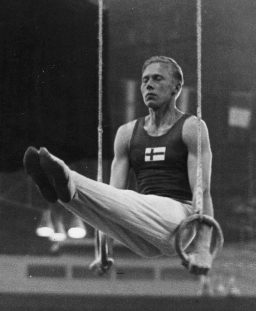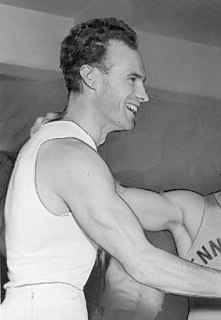
Gymnastics is a sport that includes physical exercises requiring balance, strength, flexibility, agility, coordination, dedication and endurance. The movements involved in gymnastics contribute to the development of the arms, legs, shoulders, back, chest, and abdominal muscle groups. Gymnastics evolved from exercises used by the ancient Greeks that included skills for mounting and dismounting a horse, and from circus performance skills.

The 1912 Summer Olympics, officially known as the Games of the V Olympiad and commonly known as Stockholm 1912, were an international multi-sport event held in Stockholm, Sweden, between 5 May and 22 July 1912.

France competed at the 1912 Summer Olympics in Stockholm, Sweden. 119 competitors, 118 men and 1 woman, took part in 66 events in 13 sports.

The men's horizontal bar was one of eight gymnastics events on the Gymnastics at the 1896 Summer Olympics programme. It was held on 9 April, as the sixth gymnastics event. 15 athletes from four nations entered the competition. Two winners were announced, with Hermann Weingärtner winning his first individual gold medal, which was added to his two team gold medals and his three other individual medals. His countryman, Alfred Flatow, won his first individual medal.

Great Britain, represented by the British Olympic Association (BOA), competed at the 1912 Summer Olympics in Stockholm, Sweden. 274 competitors, 264 men and 10 women, took part in 79 events in 16 sports. British athletes won ten gold medals and 41 medals overall, finishing third.
Four gymnastics events for men were contested at the 1912 Summer Olympics in Stockholm, Sweden. No women's competitions were held, though women did participate in non-competitive gymnastic displays. Including the displays, the events were held between 6 and 15 July 1912. All events took place in the Olympiastadion.

Russian Empire (Russia) competed at the 1912 Summer Olympics in Stockholm, Sweden. 159 competitors took part in 62 events in 15 sports.

Norway competed at the 1912 Summer Olympics in Stockholm, Sweden. 190 competitors, 188 men and 2 women, took part in 58 events in 14 sports.

Austria competed at the 1912 Summer Olympics in Stockholm, Sweden. Austrian and Hungarian results at early Olympic Games are generally kept separate despite the union of the two nations as Austria-Hungary at the time. 85 competitors, 76 men and 6 women, took part in 46 events in 12 sports.

Finland competed at the 1912 Summer Olympics in Stockholm, Sweden. The Grand Duchy of Finland was part of the Russian Empire at the time, but Finland's results are kept separate from those of Russia. In the Opening Ceremony Finland's team paraded under the national insignia flag of a Swedish-speaking female gymnastics club in Helsinki. 164 competitors, 162 men and 2 women, took part in 49 events in 10 sports.

Germany competed at the 1912 Summer Olympics in Stockholm, Sweden. 185 competitors, 180 men and 5 women, took part in 69 events in 14 sports. Due to the political fallout from World War I, this was that country's last appearance until 1928.

Denmark competed at the 1912 Summer Olympics in Stockholm, Sweden. 152 competitors, 151 men and 1 woman, took part in 46 events in 13 sports.

The men's discus throw was a track and field athletics event held as part of the athletics at the 1912 Summer Olympics programme. The competition was held on Friday, July 12, 1912. Forty-one discus throwers from 15 nation competed. NOCs could enter up to 12 athletes. The event was won by Armas Taipale of Finland, the nation's first medal in the men's discus throw. Richard Byrd took silver and James Duncan took bronze to continue the United States' podium streak at five consecutive Games.

The men's team, European system was an artistic gymnastics event held as part of the Gymnastics at the 1912 Summer Olympics programme. It was one of three team gymnastics events. The others were a team competition in the Swedish system and one in the free system.

The men's team competition in the Swedish system was an artistic gymnastics event held as part of the Gymnastics at the 1912 Summer Olympics programme. It was the first appearance of the event, which would only be held again at the 1920 Summer Olympics. It was one of three team gymnastics events. The others were a team competition in the free system and a standard team competition.

The men's artistic individual all-around was an artistic gymnastics event held as part of the Gymnastics at the 1912 Summer Olympics programme. The competition was held on 12 July at the Stockholm Olympic Stadium. It was the fourth appearance of the event. There were 44 competitors from 9 nations. Each nation was limited to 6 gymnasts. The event was won by Alberto Braglia of Italy, the first man to successfully defend a title in the artistic individual all-around. The bronze medalist from 1908, Louis Ségura, this time took silver. Braglia and Ségura were the first two men to win multiple medals in the event. Italian Adolfo Tunesi earned bronze.

The shot put at the Summer Olympics is one of four track and field throwing events held at the multi-sport event. The men's shot put has been present on the Olympic athletics programme since 1896. The women's event was added to the programme at the 1948 Olympics just over fifty years later.

The men's parallel bars event at the 2020 Summer Olympics was held on 24 July and 3 August 2021 at the Ariake Gymnastics Centre. Approximately 70 gymnasts from 35 nations competed on parallel bars in the qualifying round.

The men's parallel bars competition at the 1948 Summer Olympics was held at Earls Court Exhibition Centre on 12 and 13 August. It was the seventh appearance of the event. There were 122 competitors from 16 nations, with each nation sending a team of up to 8 gymnasts. The event was won by Michael Reusch of Switzerland, with his countrymen Christian Kipfer and Josef Stalder tying for bronze. Between the Swiss gymnasts was Veikko Huhtanen of Finland, taking silver. Reusch was the first man to win multiple medals in the event ; Stalder would become the second in 1952. It was Switzerland's second victory in the event, tying Germany for most gold medals.

The men's horizontal bar competition at the 1952 Summer Olympics was held at Töölö Sports Hall, Exhibition Hall I from 19 to 21 July. It was the eighth appearance of the event. There were 185 competitors from 29 nations, with each nation sending up to 8 gymnasts. The event was won by Jack Günthard of Switzerland, the nation's second consecutive and third overall victory in the horizontal bar, breaking a tie with the United States for most all-time. Switzerland also took one of the silver medals, as Josef Stalder tied with Alfred Schwarzmann of Germany, competing at the age of 40, for second. Stalder and Schwarzmann were the first two men to win multiple horizontal bars medals; Stalder had won the event in 1948 and Schwarzmann had earned bronze in 1936.



















